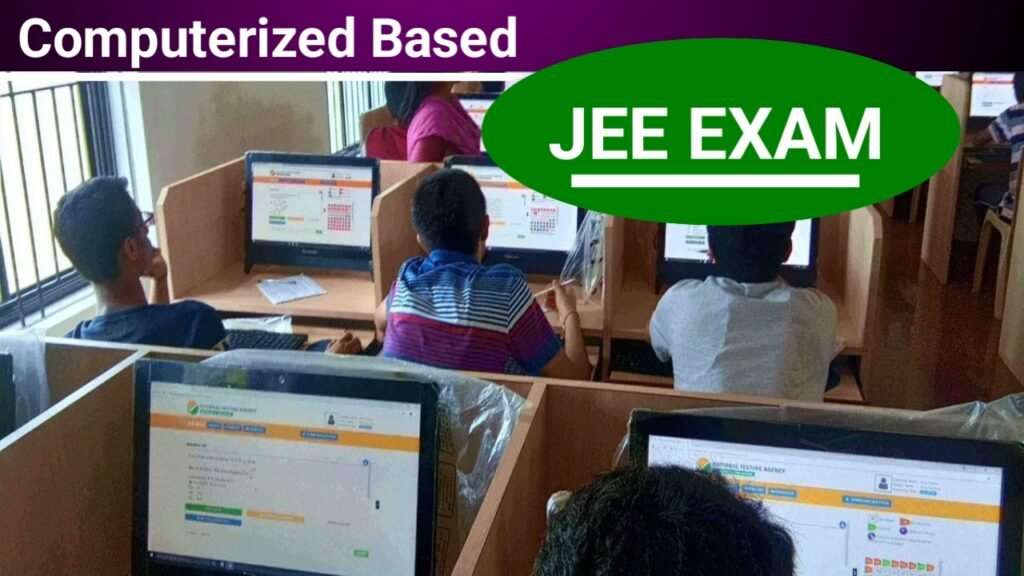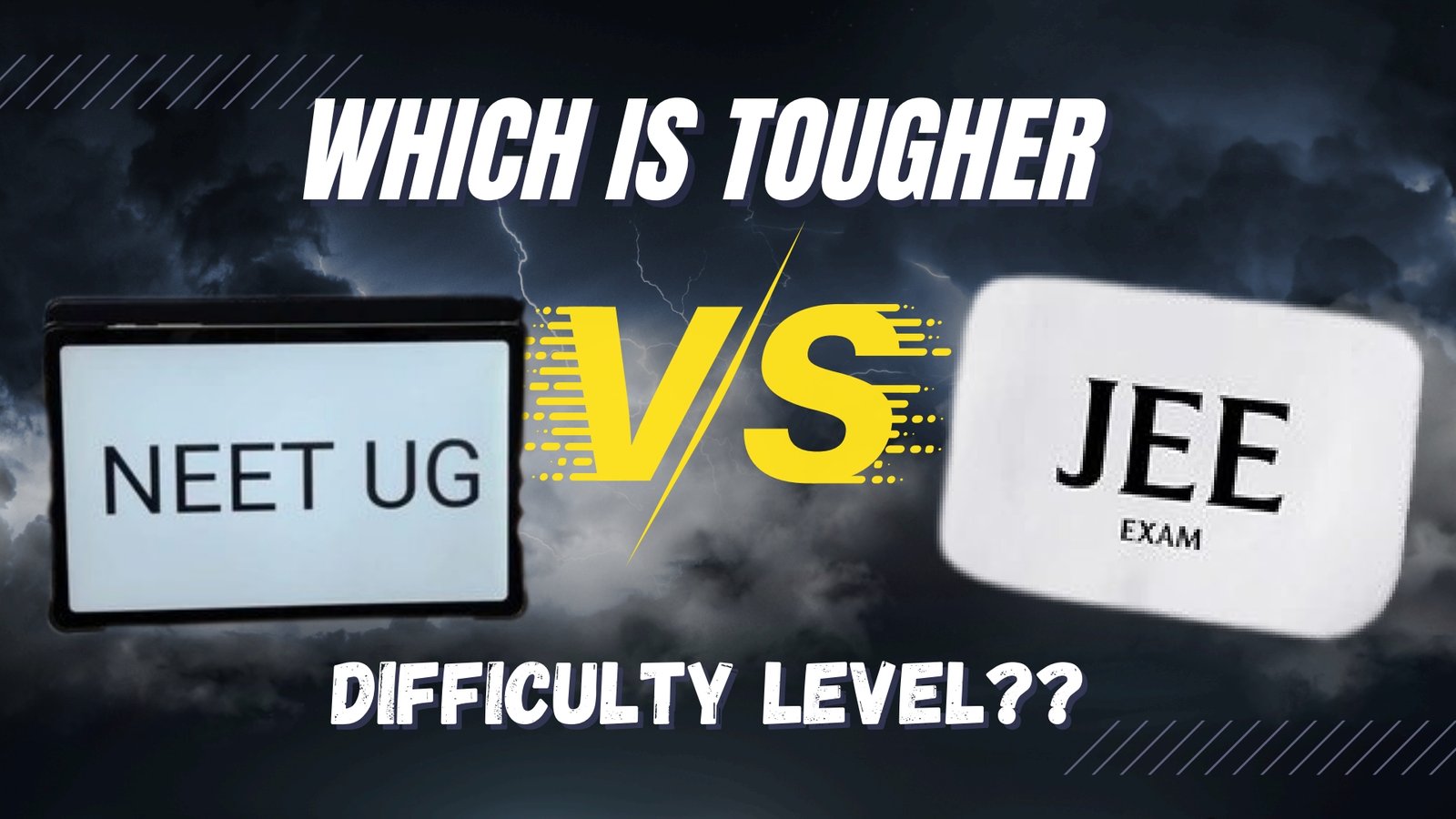Explore the differences between NEET vs JEE which is tough. Compare the challenges of each exam to consider which one is tougher for you based on your skills and goals.

NEET vs JEE:
NEET vs JEE which is tough: NEET and JEE are two important entrance exams in India, each for different fields. Here’s a simple comparison:
NEET (National Eligibility cum Entrance Test)
- Purpose: For admission to medical courses like MBBS and BDS.
- Subjects: Focuses mainly on Biology, Chemistry, and Physics.
- Format: Multiple-choice questions, especially in biology.
- Difficulty: Involves memorization and understanding of biological concepts.

JEE (Joint Entrance Examination)
- Purpose: For admission to engineering courses like B.Tech and B.E.
- Subjects: Covers Mathematics, Physics, and Chemistry.
- Format: Requires problem-solving and critical thinking, especially in math and physics.
- Difficulty: Often seen as tougher due to complex problem-solving and a wider syllabus.

Key Differences:
- Field of Study: NEET is for future doctors, while JEE is for future engineers.
- Subject Focus: NEET emphasizes biology, while JEE focuses on math and analytical skills.
NEET vs JEE, which one is good for you?
Choosing between NEET and JEE depends on your interests and career goals. Here’s a simple guide to help you decide:
NEET:
- Career Path: Best if you want to be a doctor or work in healthcare.
- Subjects: Focuses on Biology, Chemistry, and Physics.
- Nature of Work: Involves caring for patients, research, or medical practice.
JEE:
- Career Path: Great if you want to study engineering or technology.
- Subjects: Covers Mathematics, Physics, and Chemistry.
- Job Market: Look into career opportunities and job stability in each field.
In the end, the “better” choice is the one that fits your interests and goals.
What is NEET?
NEET, or the National Eligibility cum Entrance Test, is an important entrance exam in India for students who want to study medicine, such as MBBS and BDS. It is organized by the National Testing Agency (NTA) and tests knowledge in three subjects: Biology, Chemistry, and Physics. The exam features multiple-choice questions and focuses on understanding concepts, especially in biology. NEET is essential for getting into medical colleges across India, as the results decide who is eligible for various medical programs. The exam is usually held once a year and is highly competitive, attracting many candidates from all over the country.
What is JEE?
JEE, or the Joint Entrance Examination, is an important entrance test in India for students who want to study engineering, such as B.Tech and B.E. It has two parts: JEE Main and JEE Advanced. JEE Main is the first step for getting into various engineering colleges, while JEE Advanced is for admission to the top Indian Institutes of Technology (IITs). The exam tests knowledge in Mathematics, Physics, and Chemistry through multiple-choice questions and numerical problems. JEE is known to be very challenging and attracts many candidates each year, making it one of the most competitive exams in the country. Doing well in JEE can lead to great engineering opportunities and admission to prestigious institutions.
Key differences- NEET vs JEE which is tough:-
There are many major differences between NEET and JEE in the field of studies. There are also differences in terms of syllabus, frequency, exam pattern, mode of conducting the exam, eligibility criteria, etc. The table below highlights the differences between NEET and JEE:-
| Criteria | JEE (Joint Entrance Examination) | NEET (National Eligibility cum Entrance Test) |
| Purpose | Admission to engineering courses | Admission to medical and dental courses |
| Subjects | Physics, Chemistry, Mathematics | Physics, Chemistry, Biology |
| Exam Format | JEE Main and JEE Advanced | Single entrance test |
| Eligibility | 12th pass with Physics, Chemistry, Mathematics | 12th pass with Physics, Chemistry, Biology |
| Conducting Body | National Testing Agency (NTA) | National Testing Agency (NTA) |
| Exam Type | Objective type (MCQs and numerical questions) | Objective type (MCQs) |
| Number of Attempts | JEE Main: Multiple attempts; JEE Advanced: 2 attempts | One attempt per year |
| Admission Type | B.Tech/B.E programs | MBBS/BDS programs |
| Popularity | Primarily for engineering aspirants | Primarily for medical aspirants |
Criteria for NEET vs JEE:–
Here’s a table outlining the eligibility criteria for NEET and JEE:
| Criteria | JEE (Joint Entrance Examination) | NEET (National Eligibility cum Entrance Test) |
| Age Limit | No specific age limit (generally 17 years minimum) | Minimum age: 17 years; Maximum age: 25 years (with some relaxations) |
| Educational Qualification | Must have completed Class 12 or equivalent | Must have completed Class 12 or equivalent |
| Subjects Required | Physics, Chemistry, Mathematics | Physics, Chemistry, Biology |
| Minimum Percentage | 75% aggregate in Class 12 (65% for reserved categories) | 50% aggregate in Class 12 (40% for reserved categories) |
| Number of Attempts | JEE Main: Multiple attempts; JEE Advanced: 2 attempts | One attempt per year |
| Nationality | Indian citizens, OCI, PIO | Indian citizens, OCI, PIO |
| Reservation Criteria | As per government norms for various categories | As per government norms for various categories |
Syllabus, NEET vs JEE:-
The NEET syllabus primarily focuses on subjects relevant to medical education, encompassing Physics, Chemistry, and Biology. It emphasizes topics from the Class 11 and 12 NCERT curriculum, with a strong focus on understanding biological concepts, human anatomy, and chemical reactions.
In contrast, the JEE syllabus is geared towards engineering aspirants, covering Physics, Chemistry, and Mathematics. It includes more advanced mathematical concepts and problem-solving skills, with an emphasis on topics like calculus, algebra, and mechanics, also drawn from the Class 11 and 12 NCERT syllabus but with additional complexity. Both syllabuses are designed to assess students’ conceptual understanding and application of knowledge in their respective fields.
NEET 2024 Syllabus:-
Here is an analysis of the subject-wise:-
| Subject | Class 11 Topics | Class 12 Topics |
| Physics | -Physical World and Measurement | -Electrostatics |
| -Kinematics | Current Electricity | |
| -Laws of Motion | -Magnetic Effects of Current | |
| -Work, Energy, and Power | -Optics | |
| -Motion of System of Particles and Rigid Body | -Dual Nature of Radiation and Matter | |
| -Gravitation | -Atoms and Nuclei | |
| -Properties of Bulk Matter | -Electronic Devices | |
| -Thermodynamics | ||
| -Behavior of Perfect Gas and Kinetic Theory | ||
| -Oscillations and Waves | ||
| Chemistry | -Some Basic Concepts of Chemistry | -Some Basic Concepts of Chemistry |
| -Structure of Atom | -Solutions | |
| -Classification of Elements and Periodicity | -Electrochemistry | |
| -Chemical Bonding and Molecular Structure | -Chemical Kinetics | |
| -States of Matter | -Surface Chemistry | |
| -Thermodynamics | -General Principles and Processes of Isolation of Elements | |
| -Equilibrium | -p-Block Elements | |
| -Redox Reactions | -d and f Block Elements | |
| -Hydrogen and its Compounds | -Coordination Compounds | |
| -s-Block Element | -Environmental Chemistry | |
| Biology | -Diversity in Living World | -Reproduction |
| -Structural Organization in Animals and Plants | -Genetics and Evolution | |
| -Cell Structure and Function | -Biology and Human Welfare | |
| -Plant Physiology | -Biotechnology and Its Applications | |
| -Human Physiology | -Ecology and Environment |
JEE 2024 Syllabus:-
Physics 2024 Syllabus
| Week | Topic | Key concepts | Activities/ Assessments |
| 1 | Introduction to Physics | Scientific method, measurements | Lab safety training, introduction quiz |
| 2 | Kinematics | Motion, velocity, acceleration | Problem-solving exercises |
| 3 | Dynamics | Newton’s laws, forces, free-body diagrams | Group discussions, homework problems |
| 4 | Work and Energy | Work, kinetic energy, potential energy | Lab: Work-energy experiments |
| 5 | Conservation Laws | Conservation of energy, momentum | Case studies, quizzes |
| 6 | Rotational Motion | Torque, angular momentum | Project on rotational systems |
| 7 | Gravitation | Newton’s law of gravitation, orbits | Research assignment |
| 8 | Waves | Wave properties, sound waves | Wave simulation activity |
| 9 | Optics | Reflection, refraction, lenses | Lab: Optical experiments |
| 10 | Thermodynamics | Laws of thermodynamics, heat transfer | Concept maps, midterm review |
| 11 | Electricity and Magnetism | Electric fields, circuits, magnetism | Circuit design project |
| 12 | Electromagnetic Waves | Spectrum, light properties | Presentation on EM spectrum |
| 13 | Modern Physics | Quantum mechanics, relativity | Research paper on modern physics topics |
| 14 | Review and Exam Preparation | Comprehensive review of all topics | Mock exams, group study sessions |
| 15 | Final Exam | Assessment of all course content | Final exam |
Chemistry 2024 Syllabus
| Physical Chemistry | Inorganic Chemistry | Organic Chemistry |
| Basic Concepts of Chemistry | Environmental Chemistry | Hydrocarbons |
| Molecular Structure and Chemical Bonding | Coordination Compounds | Biomolecules |
| The States of Matter | f and d – Block Elements | Polymers |
| Electrochemistry and Redox Reactions | Hydrogen | Organic Compounds Containing Halogens |
| Chemical Kinetics | Process of Isolation of Metals and General Principles | Basic Principles of Organic Chemistry |
| Surface Chemistry | Classification of Elements and Periodicity in Properties | Characterization of Organic Compounds and Purification |
| Equilibrium | S- Block Elements: Alkali and Alkaline Earth Metals | Principles Related to Experimental Chemistry |
| Atomic Structure | P- Block Elements | Organic Compounds Containing Oxygen, Nitrogen |
| Chemical Thermodynamics | Chemistry in Everyday Life | |
| Solutions |
Mathematics 2024 Syllabus
- Sets and Functions
- Complex Numbers
- Quadratic Equations
- Permutations and Combinations
- Binomial Theorem
- Sequences and Series
- Limits and Continuity
- Differentiation
- Applications of Derivatives
- Integrals
- Applications of Integrals
- Differential Equations
- Straight Lines and Conic Sections
- Three-Dimensional Geometry
- Probability
- Statistics
- Trigonometry
- Vectors
- Mathematical Reasoning
- Relations and Functions
- Linear Programming
- Coordinate Geometry
PAPER 2 Architecture and Planning
The syllabus for JEE (Joint Entrance Examination) Architecture and Planning typically includes a combination of subjects aimed at assessing the candidate’s skills in design, spatial understanding, and mathematical reasoning.
1. Mathematics
- Algebra: Quadratic equations, sequences and series, matrices, and determinants.
- Calculus: Limits, continuity, differentiation, and integration.
- Coordinate Geometry: Straight lines, conics, and 3D geometry.
- Statistics and Probability: Mean, median, mode, and basic probability theory.
- Trigonometry: Trigonometric ratios, identities, and equations.
2. Aptitude Test
- Visualization Skills: Understanding and interpreting two-dimensional and three-dimensional forms.
- Design and Drawing: Basic sketching, rendering of objects, and design problems.
- Architectural Awareness: Knowledge of architecture, historical monuments, and contemporary architecture.
3. Drawing and Design
- Freehand Drawing: Drawing shapes, objects, and compositions.
- Perspective Drawing: Understanding and drawing in perspective.
- Technical Drawing: Orthographic projections and isometric views.
4. General Awareness
- Environmental Awareness: Basic knowledge of sustainable design practices.
- History of Architecture: Understanding different architectural styles and periods.
Exam Structure
- The exam usually consists of multiple-choice questions (MCQs), subjective drawing tests, and design problems.
Preparation Tips
- Solve past years’ papers and sample questions to understand the exam format.
- Practice drawing regularly to improve your skills.
- Study architectural history to familiarize yourself with different styles and concepts.
For the most accurate and updated syllabus, it’s always best to check the official JEE website or the specific institute’s guidelines, as they may vary slightly year to year.
NEET vs JEE Salary
The salary potential for NEET (National Eligibility cum Entrance Test) and JEE (Joint Entrance Examination) graduates differs because of their career paths. NEET is for future medical professionals, like doctors and dentists, who usually earn starting salaries between ₹50,000 and ₹1,00,000 per month, depending on their specialty and experience. On the other hand, JEE is for engineering students, with fresh graduates typically starting at salaries from ₹3,00,000 to ₹8,00,000 per year. While medical professionals often have higher starting salaries, engineering graduates can see faster salary growth as they gain experience in in-demand fields. Both careers can be rewarding, but their salary growth can vary a lot.

NEET vs JEE Salary – High Salary jobs for Engineers
The table below highlights high-salary jobs for engineers in India, including typical salary ranges and job roles:
| Job Role | Industry | Typical Salary Range (per annum) |
| Software Engineer | IT/Software Development | ₹6,00,000 – ₹20,00,000 |
| Data Scientist | IT/Data Analytics | ₹8,00,000 – ₹25,00,000 |
| Machine Learning Engineer | AI/Technology | ₹10,00,000 – ₹30,00,000 |
| DevOps Engineer | IT/Software Development | ₹7,00,000 – ₹18,00,000 |
| Cloud Engineer | IT/Cloud Services | ₹8,00,000 – ₹20,00,000 |
| Cybersecurity Engineer | IT/Cybersecurity | ₹6,00,000 – ₹18,00,000 |
| Blockchain Developer | IT/Finance | ₹8,00,000 – ₹25,00,000 |
| Petroleum Engineer | Oil & Gas | ₹7,00,000 – ₹15,00,000 |
| Electrical Engineer | Energy/Utilities | ₹5,00,000 – ₹12,00,000 |
| Project Manager | Construction/Engineering | ₹10,00,000 – ₹25,00,000 |
- Salary ranges can vary based on factors like experience, location, and the specific company.
- These roles are often found in major cities like Bangalore, Hyderabad, Mumbai, and Delhi NCR, where demand for skilled engineers is high.
NEET vs JEE Salary – High Salary jobs for Doctors
The table below highlights high-salary jobs for doctors in India, including typical salary ranges and job roles:
| Job Role | Specialization | Typical Salary Range (per annum) |
| Surgeon | General/Orthopedic/Cardiac | ₹12,00,000 – ₹30,00,000 |
| Anesthesiologist | Anesthesia | ₹10,00,000 – ₹25,00,000 |
| Dermatologist | Skin and Cosmetic | ₹8,00,000 – ₹20,00,000 |
| Radiologist | Imaging | ₹10,00,000 – ₹20,00,000 |
| Cardiologist | Heart Specialist | ₹15,00,000 – ₹35,00,000 |
| Gastroenterologist | Digestive System | ₹12,00,000 – ₹30,00,000 |
| Pediatrician | Child Health | ₹6,00,000 – ₹15,00,000 |
| Oncologist | Cancer Treatment | ₹12,00,000 – ₹30,00,000 |
| Neurologist | Brain and Nerve Disorders | ₹10,00,000 – ₹25,00,000 |
| Emergency Medicine Specialist | Emergency Care | ₹8,00,000 – ₹20,00,000 |
- Salary ranges can vary based on factors like experience, location, type of practice (private vs. government), and demand for specialization.
- Major cities like Mumbai, Delhi, Bangalore, and Chennai often offer higher salary potential due to greater demand and better facilities.
No. of Seats- NEET vs JEE
The seat intake for NEET (National Eligibility cum Entrance Test) and JEE (Joint Entrance Examination) varies due to the number of colleges and courses. NEET is for medical colleges, providing about 90,000 MBBS seats and 27,000 BDS seats in government and private schools. In contrast, JEE is for engineering students, offering over 1.5 million seats across around 3,500 institutions, including IITs and NITs. This large difference in available seats highlights the greater demand for engineering courses compared to medical seats, influencing competition and student choices.
Competition Level- NEET vs JEE
The competition level for NEET (National Eligibility cum Entrance Test) and JEE (Joint Entrance Examination) is quite different. NEET is very competitive, with millions of students trying for about 90,000 MBBS seats. In comparison, JEE has over 1.5 million seats in various engineering programs, but competition is still tough, especially for top colleges like IITs and NITs. While both exams are difficult, NEET faces more intense rivalry because there are fewer medical seats available compared to engineering.
Number of Attempts- NEET vs JEE
The number of attempts for NEET (National Eligibility cum Entrance Test) and JEE (Joint Entrance Examination) is different, which affects how students prepare. NEET allows a maximum of three attempts, pushing candidates to perform well since medical admissions are very competitive. On the other hand, JEE offers more flexibility, with students able to take JEE Main for three years in a row and JEE Advanced twice within two years. This difference means NEET students need to make the most of their limited attempts, while JEE students have more chances to improve their scores over time.
Strategy Tips for preparation of NEET and JEE Exams:-
- Know the Syllabus: Get familiar with the complete syllabus for JEE and NEET. Focus on key topics and their importance in the exam.
- Make a Study Plan: Create a realistic study schedule that allocates time for each subject, and stick to it.
- Use Good Study Material: Pick the right books. For NEET, NCERT textbooks are essential, while JEE may require additional reference books.
- Practice Regularly: Solve previous years’ question papers and take mock tests to boost your confidence and improve time management.
- Revise Often: Regular revision helps reinforce what you’ve learned and improves memory.
- Stay Healthy: Eat well, exercise regularly, and get enough sleep to keep your mind and body fit.
Specific Tips for JEE:-
- Focus on Concepts: JEE tests your understanding of concepts, so make sure you grasp the basics in Physics, Chemistry, and Mathematics.
- Practice Problem-Solving: Work on different types of problems, especially in Mathematics and Physics, to sharpen your analytical skills.
- Know the Exam Format: Familiarize yourself with the JEE exam pattern, including the types of questions and how they are scored.
Specific Tips for NEET:-
- Master Biology: A large part of NEET is Biology, so prioritize this subject. Study the syllabus thoroughly and practice diagrams.
- Use NCERT Books: NCERT books are crucial for NEET, especially for Biology and Chemistry. Understand and memorize key concepts.
- Practice Diagrams: Regularly practice drawing and labeling diagrams in Biology, as they help with understanding concepts better.
College Options- NEET vs JEE
College options for NEET (National Eligibility cum Entrance Test) and JEE (Joint Entrance Examination) are quite different. NEET is mainly for medical colleges, offering courses like MBBS and BDS, with around 90,000 seats available, making it very competitive. On the other hand, JEE opens the doors to engineering colleges, including top schools like IITs and NITs, with over 1.5 million seats across various engineering fields. This wide range of choices in engineering lets students pick areas like computer science, mechanical, and civil engineering, showing the different career paths each exam offers.
Career Opportunities- NEET vs JEE
After JEE (Joint Entrance Examination), students can explore various engineering careers by attending top institutions like IITs, NITs, and IIITs. They can specialize in computer science, mechanical, or civil engineering and work in IT, construction, or manufacturing industries. Graduates also have the option to continue their studies with M.Tech or MBA programs. Meanwhile, NEET (National Eligibility cum Entrance Test) leads to medical careers, primarily through MBBS and BDS programs, allowing graduates to become doctors, dentists, or healthcare specialists. Both paths offer many career opportunities, helping students choose based on their interests and strengths.
Career Opportunities after JEE:-
- Engineering Disciplines: Study computer science, mechanical, civil, electrical, electronics, and chemical engineering.
- IT and Software Development: Work in software companies as developers, testers, or project managers.
- Research and Development: Get involved in innovative projects in both public and private sectors, helping advance technology.
- Core Engineering Jobs: Join companies in manufacturing, construction, or infrastructure development.
- Higher Studies: Consider pursuing postgraduate degrees like M.Tech, M.S., or MBA for advanced knowledge and better job prospects.
- Government Jobs: Prepare for competitive exams to secure positions in public sector units (PSUs) or civil services.
- Entrepreneurship: Start your own business or tech startup using your engineering skills.
- Consultancy: Work as a consultant for engineering firms, providing expertise on specific projects.
- Data Science and Analytics: Enter the growing field of data science, applying your engineering and analytical skills.
- Teaching and Academia: Consider a career in teaching at engineering colleges or coaching institutes.
Career Opportunities after NEET:-
- Medical Doctor (MBBS): Become a general physician after completing your MBBS degree, where you’ll diagnose and treat patients.
- Dentist (BDS): Study dental surgery to become a dentist, focusing on oral health and dental treatments.
- Specialist Doctor: Further, your education to specialize in fields like cardiology, pediatrics, or surgery, usually requiring a postgraduate degree (MD/MS).
- Healthcare Administration: Manage hospitals or clinics by studying healthcare management.
- Nursing: Pursue a nursing degree to provide care to patients in various healthcare settings.
- Allied Health Professions: Explore careers in areas like physiotherapy, radiology, or lab technology, which may need additional training.
- Public Health: Work with public health organizations focusing on community health, disease prevention, or health education.
- Research and Academia: Get involved in medical research or teach in medical colleges, helping advance healthcare education.
- Pharmaceutical Industry: Work in the pharmaceutical sector, focusing on drug development, sales, or clinical research.
- Medical Writing: Create and develop medical content for publications, websites, or healthcare companies.
| Read More Like This Post | Click Here |
| Official Website | Visit Web |
